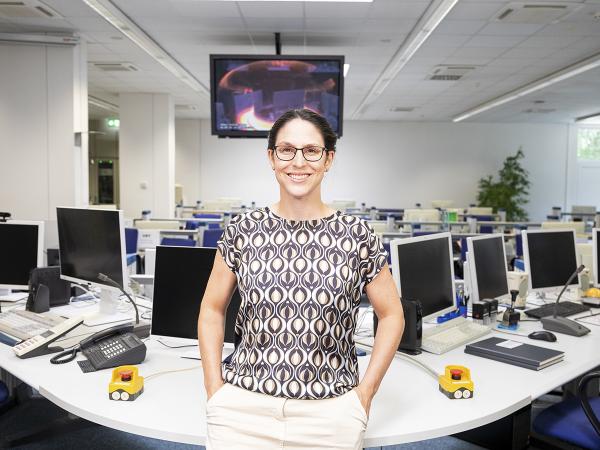
Rachael McDermott
Photo: Axel Griesch
Rachael McDermott
Max-Planck Institute for Plasma Physics, Garching
Tuesday, November 16, 2021
10:00am
Virtual
Abstract: An experimental technique has been developed at ASDEX Upgrade (AUG) to separately identify the diffusive and convective components of the boron particle flux. Using this technique a database of B transport coefficients has been assembled that shows that the normalized ion temperature gradient (R/LTi) is the strongest organizing parameter for both the B diffusion and convection and large R/LTi is a necessary ingredient to obtain hollow B density profiles in AUG.
This database also shows that large changes in the applied neutral beam injection (NBI) have a relatively small impact on impurity transport compared to similar changes in electron cyclotron resonance heating (ECRH). Even low levels of ECRH power dramatically increase both the diffusive and convective fluxes and lead to peaking of the impurity density profile. Comparisons to a combination of neoclassical and quasi-linear gyrokinetic simulations show good agreement in the measured and predicted diffusion coefficients. The outward convection measured in NBI dominated plasmas, however, is not well captured by the simulations, despite the inclusion of fast ions. In contrast, the convection is reasonably well reproduced for plasmas with flat or peaked boron density profiles. In addition, this dataset demonstrates a non-monotonic dependence of the experimental paricle diffusivity to ion heat conductivity in qualitative agreement with theoretical predictions.
Bio: Dr. Rachael McDermott did her PhD work at the PSFC at MIT. There she developed charge exchange recombination spectroscopy (CXRS) diagnostics for the Alcator C-Mod tokamak and used these diagnostics to study the radial electric field in the pedestal of H-mode plasmas. After her PhD work, Dr. McDermott accepted a post doc and, eventually, a senior research position at the Max Planck Institute for Plasma Physics in Garching by Munich, where she developed a broad suite of CXRS diagnostics to diagnose the core of ASDEX Upgrade (AUG) plasmas. Dr. McDermott research has focused on understanding turbulence induced heat, particle, and momentum transport in fusion plasmas and she is strongly involved with the international transport community. Dr. McDermott has served as a Taskforce Leader for core physics and transport at AUG, as a scientific coordinator for the EUROfusion MST program, the Chair of the European Transport Task Force, and Co-Chair of the International Tokamak Physics Activity (ITPA) on Transport and Confinement.